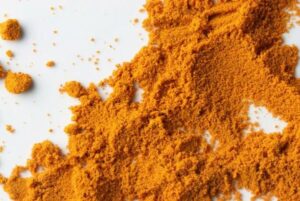Turmeric: Curry Spice or Astounding Cure-All?

A rich orange-gold spice that has been used for centuries in Asian cooking and Indian medicine, turmeric aka Curcuma longa is a wild-growing plant of the ginger family whose potential health benefits are well worth considering.
Known as “Indian saffron” in medieval Europe, turmeric is still largely produced in southern India, growing as an underground stem much like ginger. Boiled for several hours and then dried in hot ovens, the plants are ground into a deep gold powder that is used to flavor food and dye textiles – you’ll recognize it from your favorite yellow curry dish.
This versatile plant is also used in cosmetics and gardening (as an ant deterrent), and is featured in various Indian religious ceremonies as an auspicious ingredient. Bengalese brides and grooms are anointed with a turmeric paste by their friends and family as part of the wedding ceremony. A key ingredient in many Indian, Persian and Thai dishes, tumeric’s earthy, peppery, bitter flavor comes from its active ingredient curcumin – and here’s where the health claims begin.
Also responsible for the golden color of turmeric, curcumin has long been used as a component in Ayurveda, India’s traditional medicine. While absolute scientific proof is still out on the subject, many claim that curcumin provides pain relief equal or better to over-the-counter remedies such as ibuprofen. For those who have issues taking standard pain relievers, the little gold capsules of curcumin may provide much-needed pain relief.
Turmeric is also currently being investigated for its potential benefits for those with Alzheimer’s disease, arthritis, cancer and numerous other clinical disorders. An incredibly powerful antioxidant, turmeric contains other ingredients besides curcumin that offer anti-inflammatory and anti-bacterial properties. In both in vitro and animal studies, turmeric has shown to be anti-tumor, anti-oxidant, anti-arthritic and anti-inflammatory; it also treats malaria, prevents cervical cancer and interferes with virus replication in HIV and herpes. Many suggest that turmeric helps to digest fats quickly by stimulating the flow of bile in the gall bladder and use it as a diet aid.
One of the most exciting new studies shows that turmeric may prevent the plaque buildup that occurs on the brains of Alzheimer’s patients. Those in the Indian population who report a high intake of turmeric show a very low incidence of dementia. Turmeric also has been shown to slow the growth and spread of cancer twice as effectively as the commercial cancer drug Taxol.
Others insist that turmeric can reduce the inflammation from disorders such as Crohn’s disease, ulcerative colitis and Irritable Bowel Syndrome. With more and more of the medical industry looking at inflammation as the source of many ailments, turmeric’s potential anti-inflammatory properties are inspiring a whole bevy of research. Currently there are 61 registered clinical trials with the U. S. National Institutes of Health to try and determine the scientific proof behind these claims – so hopefully facts about turmeric’s medical potential will be forthcoming.
Sounds like a miracle drug, right? Keep your ears open in the future, as more and more official studies on the power of turmeric will be published. In the meantime, try it for yourself. Cook strong yellow curries for dinner and the next time you have a headache or body pains, instead of automatically popping acetaminophen or ibuprofen, reach for a couple of bright gold curcumin capsules instead. If turmeric works well with your body system, it may also offer other health benefits down the line.
image: Steven Jackson Photography

